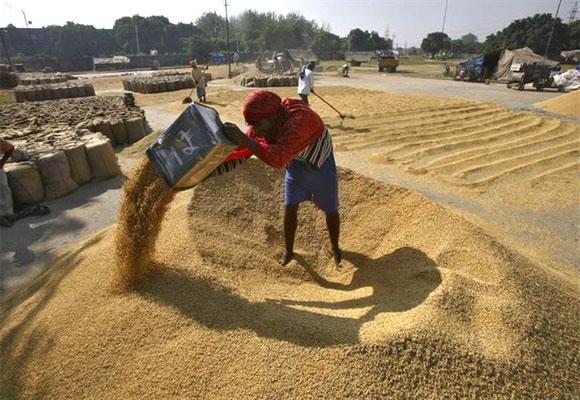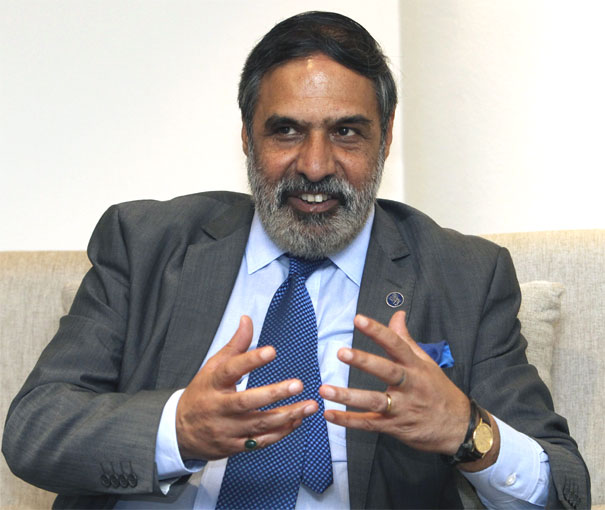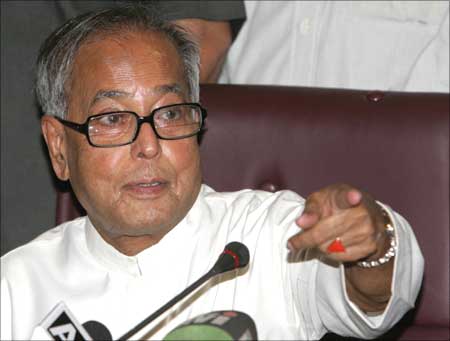 | « Back to article | Print this article |
How Indian politicians must deal with global economic matters
It's time Indian parliamentarians learnt to view global economic frameworks without the narrow prism of domestic politics, says A K Bhattacharya.
The World Trade Organisation (WTO) meeting of trade ministers in Bali early this month has once again brought to light how India’s political establishment continues to engage with international economic issues largely through the narrow prism of domestic politics. To some extent, such a linkage is perhaps inevitable.
But it becomes problematic with serious consequences for the local industry and the country’s economy when the government’s political representatives at international economic forums obfuscate issues and present misleading facts to address domestic political concerns.
At the Bali ministerial meeting, Commerce and Industry Minister Anand Sharma raised his voice against the proposed agriculture package because he believed it was necessary to ensure India’s food security. Why? Because he feared that the proposed food stockholding norms mandated under the Bali package would have restrained the government from enforcing the newly enacted food security law. Yes, protecting the Indian farmer was also one of the reasons why he opposed the Bali package.
But that was not what appeared to be the most important factor in play. The need to make sure that there were no hurdles in the way of implementing the food security law was more central to Sharma’s campaign at Bali.
Click NEXT to read more...
How Indian politicians must deal with global economic matters
Was that a tenable position? Or was that statement essentially aimed at paying lip service to the Indian farmer, a ploy many politicians use to play vote-bank politics and reap political dividends?
The fact is that the agricultural stockholding norms proposed at Bali would not have been a big headache for the Indian farmers if only the government had argued for a new base price for calculating the level of increase in subsidies doled out to farmers.
It is not clear whether within the window of the next four years the government would be able to get a new and more realistic base price level fixed for calculating the rise in subsidies level.
On the other hand, the argument that the originally proposed agricultural stockholding norms would have dealt a big blow to the food security law was clearly flawed and an obfuscation. The food security law, as framed by the Indian Parliament, provides subsidies at the consumer level and, therefore, cannot be questioned under any policy framework under the WTO regime.
Subsidies are questioned under the WTO when these are provided to producers of goods, not when these are aimed to benefit consumers, as has been envisaged under the food security law.
So, what was the need to oppose the proposed Bali package on agriculture on the ground that it would come in conflict with the food security law? The only explanation is that Sharma wanted to let everybody in India, particularly the top Congress leadership, know that his commitment to the food security law was unalloyed and total. That is also how the political establishment engages with the WTO with a view to addressing its domestic political concerns.
Click NEXT to read more...
How Indian politicians must deal with global economic matters
The problem is not of recent origin. A similar attitude prevailed when India signed the Marrakech treaty in 1994 to help form the World Trade Organisation.
Indian politicians were trying too hard to address the domestic political lobbies to show how they took extra care to protect their sectoral concerns. The larger question of the huge benefits that would arise out of a multilateral trade deal rarely figured in such political calculations and debate.
Even as early as in the 1980s, when India sought recourse to a loan from the International Monetary Fund (IMF) under the latter’s extended fund facility, domestic politics had begun influencing the way India’s political establishment would deal with the consequences of seeking financial assistance that was conditional to the government bringing about a set of key economic policy changes.
Thus, even while announcing its borrowing from the IMF, the government appeared a little defensive.
Click NEXT to read more...
How Indian politicians must deal with global economic matters
Pranab Mukherjee, who was then India’s finance minister, said that while implementing the IMF’s adjustment programme, the government would ensure that it implemented only its own policies approved by its Parliament.
Two years later, Mukherjee said, “None of the direct consequences that we were being warned about has occurred. We have not cut subsidies. We have not cut wages. We have not compromised on planning. We have not been trapped in a debt crisis. We have not faltered in our commitment to anti-poverty programmes or the welfare of our people. We entered into this loan arrangement with our eyes open. We have come out of it with our heads high.”
Much of what the minister had claimed was debatable. But the clincher was the announcement that the government had decided to return the remaining undrawn tranches of the IMF loan in the hope that the multilateral institution could use those resources to help countries that needed them. The political message was clear and the role of domestic political concerns influencing such a response was unmistakable.
Why do India’s politicians behave in this manner? It appears that India’s politicians have not yet come to terms with the need to deal with international organisations on economic matters and policies.
Even after 66 years of independence, they always seem to be afraid of losing their sovereignty while engaging with international economic frameworks in trade and financing.
It is time Indian parliamentarians were made to undergo rigorous training courses so that they realise the importance of international economic arrangements and learn to view them without the narrow prism of domestic politics.
Alternatively, let India’s commitment at international economic forums be subject to approval by Parliament. That should hopefully force a proper debate in Parliament and give India’s political establishment the courage to defend the international deals the government signs at multilateral forums.




